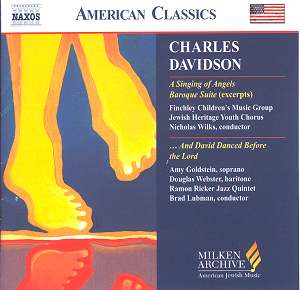Charles Davidson is
probably best known for his composition
I Never Saw Another Butterfly
(1971), which sets children’s poetry
written in the Terezin concentration
camp. On this present CD, three slightly
lesser works are given successful performances
issued as part of the Milken Archive
of American Jewish music issued on Naxos.
Davidson, like so many
American composers, is thoroughly competent
in a range of musical styles and idioms
and interested in the creative combinations
such idioms allow. The three works on
this CD are strikingly different from
one another, and if none of them are
perhaps of the very first order, all
are of real interest and all reward
attentive listening.
The earliest of them,
... And David Danced Before the Lord,
was something of a pioneer in the incorporation
of something of the musical language
of jazz and blues into a setting of
the Sabbath Eve service. It was written
at much the same time as Gershon Kingsley’s
Jazz Psalms, also now available on Naxos
(see reviews by Steve
Arloff ; Adam
Binks and Glyn
Pursglove ). Davidson’s setting
was written and first performed to a
commission from cantor Richard Botton,
premiered in Long Beach, New York and
broadcast on CBS television. The booklet
notes by Neil W. Levin – as exhaustive
and interesting as they are for all
of these Milken releases – tell us that
"in the congregation that night
was a teenage Billy Crystal, on whom
the work made so great an impression
that he requested it years later for
his own daughter’s bar mitzvah
in California"! The work alternates
between Hebrew and English and, for
all its employment of jazz inflections
and rhythms, Davidson’s music is thoroughly
steeped in the musical traditions of
the synagogue; the two traditions are
- on the whole – blended pretty successfully.
Douglas Webster is a particularly swinging
baritone! At times Davidson’s jazz language
seems a little ‘bookish’ and to come
less than completely naturally, but
in this performance the idiomatic playing
of instrumentalists such as Ricker,
Vatalaro and Thompson do much to convince
the listener. This is an intriguing
musical ‘fusion’ which soon persuades
one that it is much more than merely
a gimmick.
A Singing of Angels
sets nine Yiddish folk songs from Eastern
Europe, in English language versions.
Neil Levin’s notes provide generous
detail on the origins and history of
each song – information which adds much
to the pleasure one gets from listening
to Davidson’s own versions. Particular
pleasures include "If Dreams Came
True", in which Davidson’s addition
of a triple-meter countermelody works
particularly well, and the vitality
of his version of "The Merry Rebbe
Elie". "My Pages are Snowy
White" has real charm and "In
the Valley" responds attractively
to a strange, playful text. Throughout
the singers of the Finchley Children’s
Music Group perform the music with understanding
and unpretentious innocence, and there
is much that is touching and gracious
in this sequence.
Davidson’s Baroque
Suite, which Levin aptly describes
as "a stylised Hebraic echo of
Western Baroque musical idioms",
was commissioned by the Beth Abraham
Youth Chorale, who gave the premiere
in Dayton, Ohio, in 1976. It sets poems
by the great medieval poet Yehuda Halevi
(c.1054-1141). The complete suite is
made up of eight movements, four of
which are heard here – a courante, a
sarabande, a minuet and a fugue. It
will be seen from these titles that
Davidson’s Baroque Suite is,
in part at least, modelled on the dance
suites so familiar in the music of the
baroque. But this is a choral work,
rather than an instrumental composition.
And it sets Hebrew texts. Again "fusion"
– but not in its all-too-easily derogatory
contemporary sense – seems the right
word for what Davidson has produced.
But there is more than mere pastiche
going on here; the results have a plausible,
coherent voice of their own. The vocal
lines are attractive and undemonstratively
‘Jewish’, the flute obbligati are interesting
and well conceived, the harpsichord
continuo is thoroughly competent. And,
perhaps surprisingly, the whole thing
hangs together. I’d like to hear the
whole work one day.
There are no revelatory
masterpieces here; but there is much
music of real intelligence and charm,
which draws in a range of idioms with
purposeful creative generosity.
Glyn Pursglove


